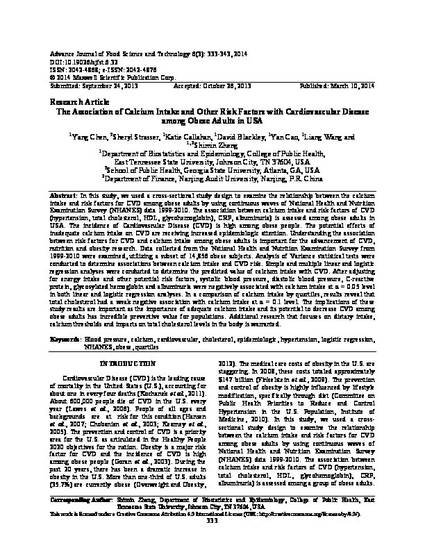
In this study, we used a cross-sectional study design to examine the relationship between the calcium intake and risk factors for CVD among obese adults by using continuous waves of National Health and Nutrition Examination Survey (NHANES) data 1999-2010. The association between calcium intake and risk factors of CVD (hypertension, total cholesterol, HDL, glycohemoglobin), CRP, albuminuria) is assessed among obese adults in USA. The incidence of Cardiovascular Disease (CVD) is high among obese people. The potential effects of inadequate calcium intake on CVD are receiving increased epidemiologic attention. Understanding the association between risk factors for CVD and calcium intake among obese adults is important for the advancement of CVD, nutrition and obesity research. Data collected from the National Health and Nutrition Examination Survey from 1999-2010 were examined, utilizing a subset of 14,856 obese subjects. Analysis of Variance statistical tests were conducted to determine associations between calcium intake and CVD risk. Simple and multiple linear and logistic regression analyses were conducted to determine the predicted value of calcium intake with CVD. After adjusting for energy intake and other potential risk factors, systolic blood pressure, diastolic blood pressure, C-reactive protein, glycosylated hemoglobin and albuminuria were negatively associated with calcium intake at &alpha = 0.05 level in both linear and logistic regression analyses. In a comparison of calcium intake by quartiles, results reveal that total cholesterol had a weak negative association with calcium intake at &alpha = 0.1 level. The implications of these study results are important as the importance of adequate calcium intake and its potential to decrease CVD among obese adults has incredible preventive value for populations. Additional research that focuses on dietary intake, calcium thresholds and impacts on total cholesterol levels in the body is warranted.
Available at: http://works.bepress.com/shimin-zheng/67/

© 2014 Maxwell Scientific Publication Corp. This document was originally published in Advance Journal of Food Science and Technology.